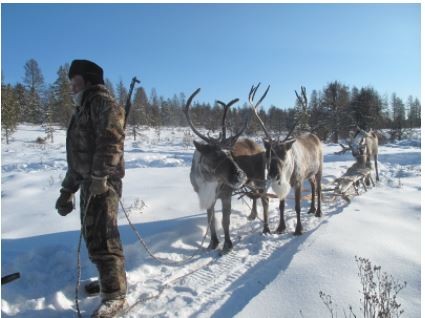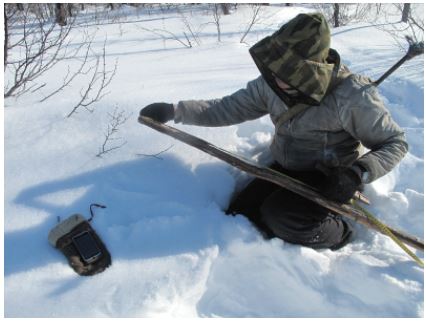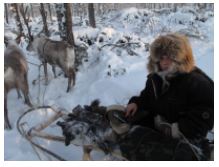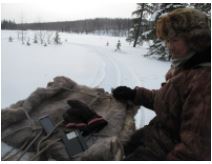You are here : OVSQENObservationMeasuring campaignsBRISK
- Updated on February 12, 2021
- PDF version
BRISK
BRISK (BRidging Indigenous and Scientific Knowledge about global change in the Arctic) is a project funded by the National Research Agency (ANR) with co-funding from IPEV (Institut Polaire Paul Emile Victor).
Based on case studies in Lapland (Norwegian and Swedish) and in Siberia among reindeer herders (South Yakutia / Amur, Tuva Republic), the BRISK project develops innovative methodologies of observation by establishing observation systems of environmental and social changes in conjunction with the local people for the co-production of knowledge.
Thus, the BRISK project includes several observatories monitored by different researchers:
Based on case studies in Lapland (Norwegian and Swedish) and in Siberia among reindeer herders (South Yakutia / Amur, Tuva Republic), the BRISK project develops innovative methodologies of observation by establishing observation systems of environmental and social changes in conjunction with the local people for the co-production of knowledge.
Thus, the BRISK project includes several observatories monitored by different researchers:
- Alexandra Lavrillier (teacher-researcher, CEARC) with Evenk reindeer herders in Russia,
- Tozhu Tuvans reindeer herders in Siberia,
- Samuel Roturier (AgroParisTech) and Marie Roué (National Museum of Natural History - MNHM - UMR 7206), among the Sami people in Sweden.
The Evenk reindeer herders
The most advanced observatory is located in one of the largest areas occupied by the nomadic Evenks of Russia. This area extends over 7,000 km² and has around 15,000 reindeer divided into 250 herds or herds (40-100 reindeer per herd).Today, reindeer are owned by three types of economic unit:
- companies that emerged after the collapse of Soviet power,
- indigenous mini-enterprises (family cooperatives recognised by the Russian government),
- private breeders (not officially recognised).
The transdisciplinary observatory among the Evenks is located in the border area between the south of Yakutia (Sakha republic) and the north of the Amur region. Although these Evenks belong to the same families and have guided their herds together for centuries, they have been divided into two regions (Yakutia and Amur) since 1935, which poses some legal and territorial complications.
In this type of breeding where the main resources come from hunting (food, furs), reindeer breeding provides a means of transport and milk, as well as a reserve of meat in the event of food shortages. This implies a strong dependence on the natural environment.
The Evenks studied live in a natural mountainous forest with a rich cover of vegetation. The continental climate varies from -50 ° C to + 30 ° C. Some areas are very rugged with fast-flowing rivers and streams, while other wider valleys offer landscapes of bogs and meadows, ideal pastures for reindeer in summer.
The BRISK project came from a request from the local community to better understand the changes in climate and environment that can become a threat, not only to the environment or traditional economy, but also to societies and their cultures.
Reindeer herders have been confronted for many years with the impacts of climate change, in addition to environmental changes linked to regional, national and international policies, extraction industries (gold mining, coal), deforestation and even to the construction of dams, oil pipelines, roads and railways. While the Evenks have been dealing with the extractive industries since the end of the 19th century, recent developments show a significant increase in industrial projects occurring within their nomadic areas or close by.

A. Lavrillier
The Evenks have noticed climate and environmental changes for several decades, for example, rising temperatures in both winter and summer, sharp variations in weather and unexpected temperature jumps, as well as an increase in summer precipitation, but these changes have been happening much faster over the past 5-10 years. [1] The coldest period of winter is now two months shorter than it was 30 years ago and therefore the period of snow is getting shorter. According to the Evenks, this warming is the cause of the increase in forest fires and changes in flora and fauna (extinction or appearance of species).

A. Lavrillier
The Evenk Observatory methodologies were designed in collaboration by reindeer herders, climatologists, anthropologists and ethnobiologists. The observatory was established in winter 2013 by S. Gabyshev, L. Egorova (Evenks) and A. Lavrillier. It provides daily observations based on criteria from both indigenous and scientific understanding (social and environmental science).
In addition, Gabyshev and Lavrillier (with the help of the breeders) have developed many products for the co-production of knowledge on the following subjects:
- indigenous environmental knowledge,
- environmental changes,
- mapping of land uses,
- adaptation practices,
- the socio-economic impacts of global changes.
BRISK

S. Gabyshev

A. Lavrillier

A. Lavrillier


